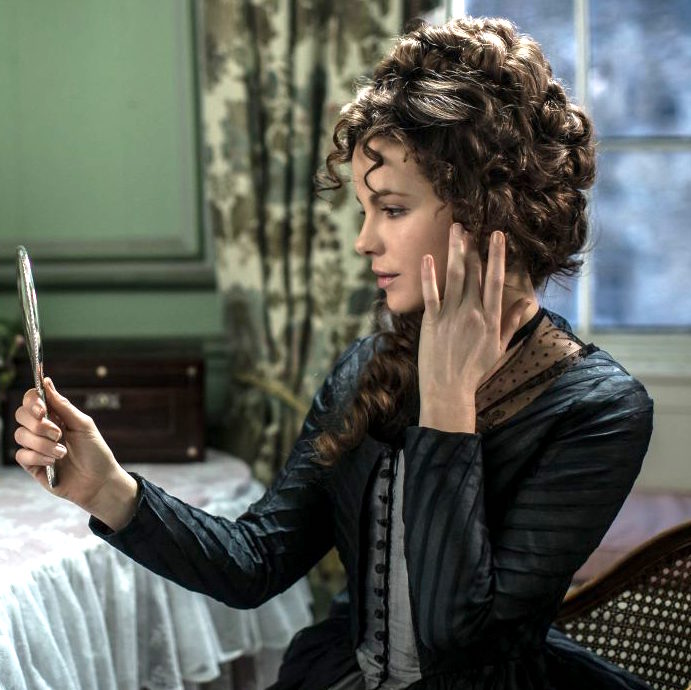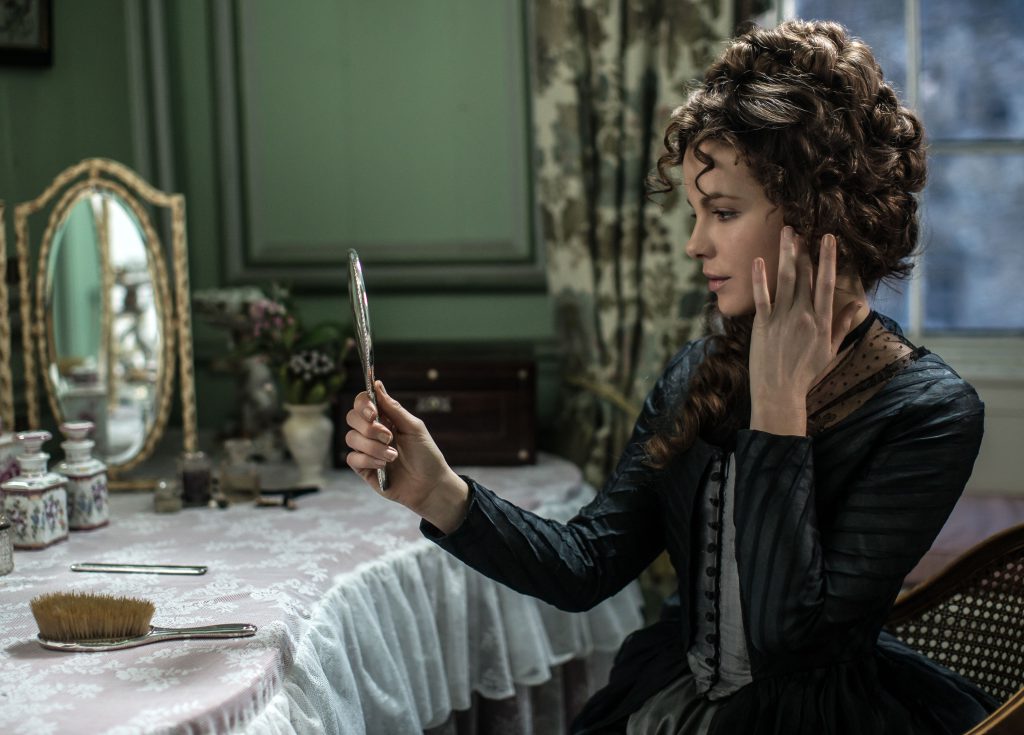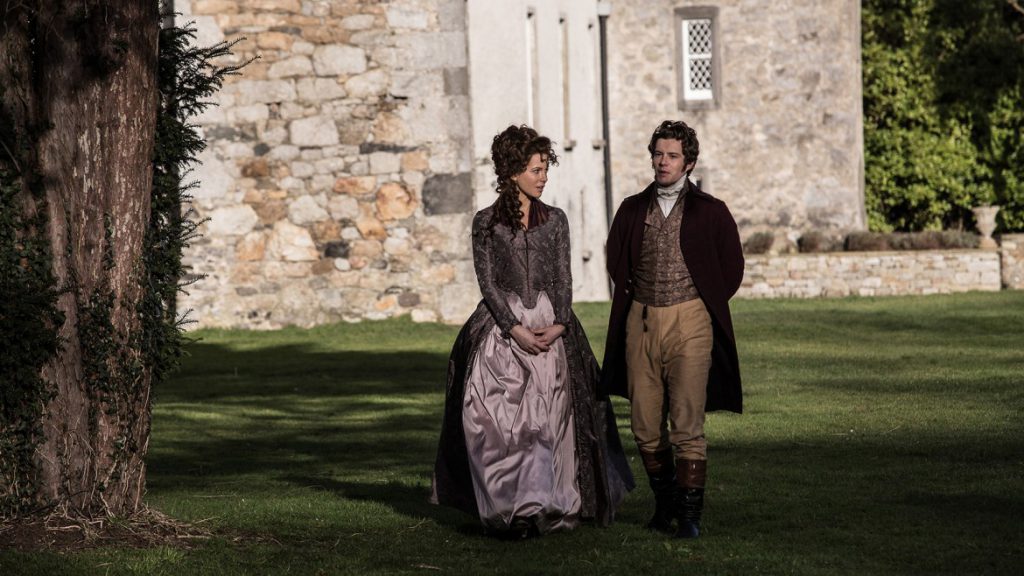
Just in time for the DVD release of Love and Friendship, here’s a wonderful post about the film from our friend, Jeremiah Lawson.
The character Charlie Black made an observation disguised as a question in the 1990 film Metropolitan: why is it that the stories about social mobility Americans are drawn to only have upward trajectories? When’s the last time you saw somebody tell a story of downward mobility? Just to be clear, this downward mobility is not the Faustian rock and roll burn out but the fading away. Not that Charlie Black would have put it that way; he probably didn’t listen to rock. He might have preferred to say that Robert Frost warned us that nothing gold can stay and that we might need to stop and think about whether we’re that gold.
Ever since Metropolitan, Whit Stillman has been telling stories of styles and movements and people on the cusp of decline, how they perceive and react to its possibility. Whether it’s the winding down of the Cold War for two young men in Barcelona or underemployed college graduates in The Last Days of Disco, Stillman’s characters are striving to get into or retain access to clubs whose days are numbered, champions of styles they don’t realize are already going out of fashion.
Of course, most of his films tell stories of people who have not yet fully crossed the threshold of the social/historical precipice. We met the Sally Fowler rat pack before the debutante culture had run out of gas. The Cold War was not yet over for Ted and Fred in Barcelona, so they could imagine that, really, everyone in Europe ought to still be grateful for American heroism and industry. Alice and Charlotte could groove to the club scene as long as they didn’t catch any STDs that antibiotics couldn’t cure. Violet goes through the majority of Damsels in Distress trying to save other people from committing suicide without so much as directly confronting the possibility that she struggles with depression and suicidal ideation herself. It can be easier to help others than to admit your own sublimated desperation. Perched on the verge of a moment of death, these characters are all spared tumbling over the precipice. We never got to see how Stillman’s protagonists would cope with the reality of plummeting from their social station.
Or at least that was the case up until Love and Friendship, Stillman’s adaptation of Jane Austen’s Lady Susan. In his version of the titular character’s social tumble, Stillman gives us a protagonist who’s on the other side of the decline Charlie Black worried about. She’s also the sort of arrogant titled and entitled aristocrat that Nick Smith would hate.
Love and Friendship opens with Lady Susan leaving the estate of the Manwaring family. Having gone there in the months after the death of her late husband, Susan has ingratiated herself to Lord Manwaring and to a Mr. James Martin. The trouble is telegraphed: Manwaring is a married man and Mr. Martin an engaged one, but Susan has seduced them both without the slightest compunction. Once rumors of her exploits spread, she takes refuge at her brother-in-law’s estate until the scandal subsides, where her sister-in-law, Catherine Vernon, greets word of Susan’s sudden “anxiety to meet me and to know the children” with skepticism because “It’s never concerned her before.”
We soon learn that Lady Susan’s aim is to secure a husband for herself and particularly for her daughter Frederica, who has been shunted from one boarding school to another. Susan pours out her plans to her friend Mrs. Alicia Johnson, an American expatriate whose family sided with the English crown during the American Revolutionary War and the one other person in Austen’s narrative who shares Lady Susan’s hedonistic and conniving cynicism. Susan tells Alicia that if she didn’t have the dumbest daughter on the face of the earth her Frederica should have been engaged to Mr. Martin already. Her voice dripping with disdain, Susan remarks of her daughter: “She refused him! A baronet with 10,000 a year. It’s all so provoking.” We soon realize that Lady Susan is a master manipulator whose troubles have yet to humble her spirit in the slightest. She views all those she meets in her new surroundings with contempt. Yet Lady Susan has nowhere else to go, so there she will go.
 Played by the marvelous Kate Beckinsale, Lady Susan Vernon is cynical, contemptuous, and magnificently charming. She’s able to convince sister-in-law’s callow younger brother Reginald de Courcey that she has not only been misjudged by those who regard her as “the most notorious flirt in England” but that she has been the victim of terrible rumors. In other words, she goes to work on Reginald, and he soon finds himself under her spell.
Played by the marvelous Kate Beckinsale, Lady Susan Vernon is cynical, contemptuous, and magnificently charming. She’s able to convince sister-in-law’s callow younger brother Reginald de Courcey that she has not only been misjudged by those who regard her as “the most notorious flirt in England” but that she has been the victim of terrible rumors. In other words, she goes to work on Reginald, and he soon finds himself under her spell.
When Frederica appears at the Vernon house in Churchill, she implores her mother, privately, that she not be compelled to marry Mr. Martin. For, you see, as everyone in the story says, Mr. Martin is a bit of a rattle (“He’s no Solomon”). Indeed, as soon as Mr. James Martin appears and gets his first line he establishes beyond all doubt he is an idiot. If you were to imagine a point of comparison from film in the last ten years, you could say that Mr. Martin is so stupid he makes Karen Smith from Mean Girls seem possessed of a nimble wit. Martin manages to make himself look like a fool with every sentence he utters.
Frederica desperately wants to be spared a life married to this moron. Her mother will brook no protest, and tries to bind her daughter’s silence by invoking the Decalogue, thus setting up one of the best punchlines in the film. She implores Frederica to “remember the Fourth Commandments”, which she thinks is “honor thy father and mother”, which it is–but in the Catholic rather than Anglican tradition. (Mr. Martin, for his part, assumes there are Twelve Commandments). When Frederica inquires of the local curate about proper observance of the Fourth Commandment, he launches into an unintentionally hilarious reverie on the beauty of Sabbath observance, thus uncovering her mother’s lax religiosity.
It is striking that Stillman’s films all feature characters and plotting that hinge upon religious education. It might be a wry remark like the one from the mouth of Nick Smith in Metropolitan about a 20th century generation being the most bloodthirsty since the Protestant Reformation. It might be Ted Boynton in Barcelona praying for his wounded cousin and awkwardly asking his visitor if, Protestant though he is, could say some Catholic prayers for his relative. It might be that a man rumored to have gone insane during a manic episode was able to calm his nerves by singing a hymn. Or, perhaps most memorably, it might be a young co-ed being bamboozled by a European Lothario into having a certain type of sexual encounter because he claims it’s in keeping with his Cathar convictions.
While Susan Vernon is technically a Jane Austen creation, she is also very much in keeping with this signature of Stillman: a character who finds it useful to invoke the authority a historic religion conveys without having the slightest idea what either the spirit or even the letter of the law actually says. It’s left to the literate faithful or simply the skeptical to ask some simple question that reveals the charade.
As the Vernon family and Reginald deCourcey begin to unravel the manipulations and deceptions of Lady Susan, Alicia Johnson is told by her husband she’ll receive a Connecticut exile for helping Susan. Alicia suggests that if Susan has failed to compel Frederica to marry Mr. Martin perhaps she should concede defeat there but victory elsewhere. Alicia asks Susan, “Can you afford to bestow Sir James on Frederica when you have no Sir James of your own?”
Susan stops, “Are you insulting me?”
“Of course not, you can have Mr. Decourcey whenever you want him. But is he really worth having?”
Susan never seems to fully grasp that Alicia managed to advise her out of a disaster at the expense of her own marriage.
Anyway, as the Vernons are resolving to protect Frederica from being forced to marry Mr. Martin Alicia Johnson has proposed that Lady Susan take Mr. Martin for herself for her own self-interest. It is here that this adaptation shifts from being Austen’s novella into a Whit Stillman twist. Ironically, by doubling down on her own self-seeking vices at the advice of her only friend, Susan decides to marry the idiot Mr. Martin and spare the young and neglected Frederica from having to live with the kind of marriage only someone as cynical as her mother could tolerate.
To borrow T. S. Eliot’s old dictum, Lady Susan has done the right thing for the worst possible reason … but at least she’s finally done one thing right by her daughter’s interests, however inadvertently. As in later stories Jane Austen would write, this tale ends with two weddings and something like a happy ending, but Susan is the schemer who, mostly, manages to get away with her schemes in intent, if not in formal execution.
And so a happy ending for, well, Frederica is spared the agony of having to be the wife of Mr. Martin and, instead, ends up marrying the similarly young and idealistic Reginald. Lord and Lady Manwaring separate and as Mr. Johnson (Alicia’s husband) was her guardian, the ragtag team of people done wrong by Lady Susan all arrive at the Martin home. Mr. Martin regales Alicia with how Lord Manwaring is a capital fellow who loves to hunt and their staying at the Martin house with him and Lady Susan has been great.
Stillman’s Love and Friendship brings Austen’s story vividly to life, illustrating in all sorts of ways how “charm is deceptive and beauty is vain”. Susan Vernon is praised for her physical beauty and is considered brilliant and charming, but her virtues are, as the saying goes, only skin deep. Her sister-in-law Catherine regards her as a genius but a diabolical one, a brilliant beauty obsessed with pleasure and self-preservation. About a century after Austen wrote Lady Susan, G. K. Chesterton summed up the trouble of the modern world in a way that could describe Stillman’s plucky anti-heroine:
The modern world is not evil; in some ways the modern world is far too good. It is full of wild and wasted virtues. When a religious scheme is shattered…it is not merely the vices that are let loose. The vices are, indeed, let loose, and they wander and do damage. But the virtues are let loose also; and the virtues wander more wildly, and the virtues do more terrible damage. The modern world is full of the old Christian virtues gone mad. The virtues have gone mad because they have been isolated from each other and are wandering alone.

COMMENTS
3 responses to “Lady Susan Finesses Downward Mobility in Whit Stillman’s Love and Friendship”
Leave a Reply
















My wife and I really needed to read this BEFORE we saw this film. We may have been able to suffer “less” through it.
Going in, we thought, Stillman?, Austen?, a gazillion percent positive on Rotten Tomatoes? What could go wrong?
Well, everything, at least on first viewing. Whereas, here, I love both the Chesterton tie in and the exploration of virtue run amuck, the film itself is a bit of a slog.
While Beckinsale plays Lady Susan in every bit the way you describe, and is deserving of praise for a great performance, the character itself didn’t connect with me as a viewer, at all. I’m not sure who to blame. Is it Austen?, for writing an insufferable (for the viewer) character, or Stillman?, for not being able to bring some semblance of an anti-hero to life on screen.
I’d be curious to know if I’m the only one. My wife and I love British period films and programming, and particularly Austen films and adaptations without exception (until now). We have never walked out of a movie theater, and we have gone together hundreds and hundreds of times. This was the closest we were to walking out since Gary Sinese’s “Imposter”……again, did anyone else have this experience?
Considering how self-serving and vindictive Charlotte could be in The Last Days of Disco I thought that this was all a pretty compelling and natural progression of the kind of work Stillman and Beckinsale had already done together. Self-serving schemers have always had significant roles in Stillman’s films–what’s new here is “just” that the self-serving schemer is the central character.
The outright nasty nature of Lady Susan was definitely Austen’s intent. Stillman and everyone else on the film did a fine job bringing that to life on screen, but compared to Austen’s more famous and mature works Lady Susan’s considered kind of racy and shocking compared to what we’ve been taught to expect of her, especially by cinematic adaptations of her work. Lady Susan is an early work, before she’d settled into her more well-known style and voice.
As a satire of the kind of novel from Austen’s time in which a virtuous heroine escapes the Lothario, Lady Susan is a complete inversion of that trope, giving us a diabolical older widow who is beautiful but unscrupulous, a kind of femme fatale before that trope could appear in the hard-boiled noire genre that would come a century later in American detective stories.
In the last twenty years approaches to Austen have tended to present Austen’s stories and characters in terms of sentimental romance and romanticism (the Knightley vehicle immediately comes to mind). I’d say Austen’s more properly understood as a dry but still occasionally scathing satirist of class and customs. We’ve gotten a few too many Austen adaptations that layer on sentimentality to the point where the very sharp edges of her humor, however deftly she used it, can be more prominent. So that’s my take on why critics have loved this Austen adaptation as much as they have.
Thanks for responding Jeremiah, I fully validate your take on Austen and the film, and agree that the “Knightly” P&P adaptation doesn’t hold a candle to the earlier PBS miniseries.
I think that you give an excellent explanation as to why the critics (and the ones I almost always agree with, BTW) love this film.
“Accessibility” is just an issue for me here. The good critics (and I’m not one) don’t necessarily need to feel a connection with a film to be enthralled with it…..I have the same issues with some Tarantino and Mallick films – they both have made some films that I can admire from a professional distance, but just can’t cozy up to.